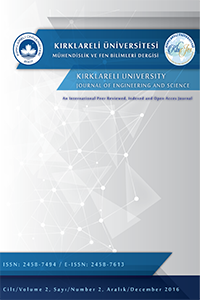Abstract
Türkiye elektriği ithal eden bir ülke konumundadır. Sürdürülebilir kalkınmayı başarmış ülkelerin birçoğu ve gelişmiş ülkelerin hepsi nükleer güç santrallerine yaklaşık 40 yıl öncesinden yatırım yapmışlar ve en azından kendi enerji ihtiyaçlarının %20 ile %70 ini nükleer enerjiden sağlamaktadırlar. Türkiye de politikacıların koyduğu, nükleer güç santrallerinden elektrik üretimi yoluyla ulaşılacak hedefler vardır. Enerjiye olan bağımlılık nedeniyle oluşan cari açığında azaltılması bu hedeflerden birisidir. Bu makalede, nükleer enerjinin yaygınlaşması ve nükleer enerjiye geçişi hızlandırmayı etkileyen faktörleri belirlemek amacıyla Türkiye'nin geçmiş ve mevcut durumları, motivasyon, kapasite ve stratejileri analiz edilmektedir.
Keywords
References
- [1] İşleri E., Özen C., Türkiye’ de Sürdürülebilir Enerji Politikaları Kapsamında Nükleer Enerjinin Konumu, İ.Ü. Siyasal Bilgiler Fakültesi Dergisi, No.47, pp.161-180, 2012.
- [2] Qureshi K., Role of Advanced Nuclear Reactor Technologies in Meeting the Growing Energy Demands, IEEE, doi. 978-1-4673-6813-1/15/$31.00, 2015.
- [3] Soykenar M., Coşkun S., Toplum ve sağlik etkileri yönüyle nükleer enerjiye genel bir bakış, TAF Preventive Medicine Bulletin,Vol.14, No. 1, pp. 65 – 70, 2015.
- [4] Sözen A., Boran K., Türkiye’ nin Enerji Projeksiyonunda Nükleer Santrallerin Yeri, Teknoloji, Vol. 3, No.2-3, pp. 157-169, 2000.
- [5] Yapıcı G., Nükleer Enerji ve Türkiyenin ilk Nükleer Santrali “Akkuyu”, Ocak - Şubat Vol. 30, No:1, pp. 42-55, 2015.
- [6] Saidi K., Mbarek M. B., Nuclear energy, renewable energy, CO2 emissions, and economic growth for nine developed countries: Evidence from panel Granger causality tests, Progress in Nuclear Energy, Vol. 88, pp.364-374, 2016.
- [7] Erdogan M., Kaya I., A combined fuzzy approach to determine the best region for a nuclearpower plant in Turkey, Applied Soft Computing 39 (2016) 84–93.
- [8] Sirin S. M., An assessment of Turkey’s nuclear energy policy in light of South Korea’s nuclear experience, Energy Policy, Vol. 38, pp. 6145–6152, 2010.
- [9] Jewella J., Ates S. A., Introducing nuclear power in Turkey: A historic state strategy and future prospects , Energy Research & Social Science , Vol. 10, 273–282, 2015.
- [10] Prospects for Nuclear Power in the Middle East: Russia’s Interests, Valdai Discussion Club Grantees Report, ISBN 978-5-906757-15-9, Moscow, 2016.
- [11] http://www.world-nuclear.org/information-library/countryprofiles/countries-t-z/turkey.aspx: Nuclear Power in Turkey, (Last access: Oct. 1, 2016)
Abstract
Turkey is the country which imports electricity. Advanced and almost all of the countries that have achieved sustainable development have made investment nuclear power plants about 40 years ago and these countries provide at least 20% to 70% of its energy needs from nuclear energy. Policy makers of Turkey have various goals to achieve through electricity generation in nuclear power plants (NPP). In this way, they are targeting to to decrease the current deficit caused by such dependence. This paper analyzes Turkey’s past and present stuations, motivation, capacity and strategies to determine the factors which influence spread of nuclear power and accelerating the transition to nuclear energy.
Keywords
References
- [1] İşleri E., Özen C., Türkiye’ de Sürdürülebilir Enerji Politikaları Kapsamında Nükleer Enerjinin Konumu, İ.Ü. Siyasal Bilgiler Fakültesi Dergisi, No.47, pp.161-180, 2012.
- [2] Qureshi K., Role of Advanced Nuclear Reactor Technologies in Meeting the Growing Energy Demands, IEEE, doi. 978-1-4673-6813-1/15/$31.00, 2015.
- [3] Soykenar M., Coşkun S., Toplum ve sağlik etkileri yönüyle nükleer enerjiye genel bir bakış, TAF Preventive Medicine Bulletin,Vol.14, No. 1, pp. 65 – 70, 2015.
- [4] Sözen A., Boran K., Türkiye’ nin Enerji Projeksiyonunda Nükleer Santrallerin Yeri, Teknoloji, Vol. 3, No.2-3, pp. 157-169, 2000.
- [5] Yapıcı G., Nükleer Enerji ve Türkiyenin ilk Nükleer Santrali “Akkuyu”, Ocak - Şubat Vol. 30, No:1, pp. 42-55, 2015.
- [6] Saidi K., Mbarek M. B., Nuclear energy, renewable energy, CO2 emissions, and economic growth for nine developed countries: Evidence from panel Granger causality tests, Progress in Nuclear Energy, Vol. 88, pp.364-374, 2016.
- [7] Erdogan M., Kaya I., A combined fuzzy approach to determine the best region for a nuclearpower plant in Turkey, Applied Soft Computing 39 (2016) 84–93.
- [8] Sirin S. M., An assessment of Turkey’s nuclear energy policy in light of South Korea’s nuclear experience, Energy Policy, Vol. 38, pp. 6145–6152, 2010.
- [9] Jewella J., Ates S. A., Introducing nuclear power in Turkey: A historic state strategy and future prospects , Energy Research & Social Science , Vol. 10, 273–282, 2015.
- [10] Prospects for Nuclear Power in the Middle East: Russia’s Interests, Valdai Discussion Club Grantees Report, ISBN 978-5-906757-15-9, Moscow, 2016.
- [11] http://www.world-nuclear.org/information-library/countryprofiles/countries-t-z/turkey.aspx: Nuclear Power in Turkey, (Last access: Oct. 1, 2016)
Details
| Primary Language | English |
|---|---|
| Subjects | Engineering |
| Journal Section | Research Article |
| Authors | |
| Publication Date | December 30, 2016 |
| Published in Issue | Year 2016 Volume: 2 Issue: 2 |

